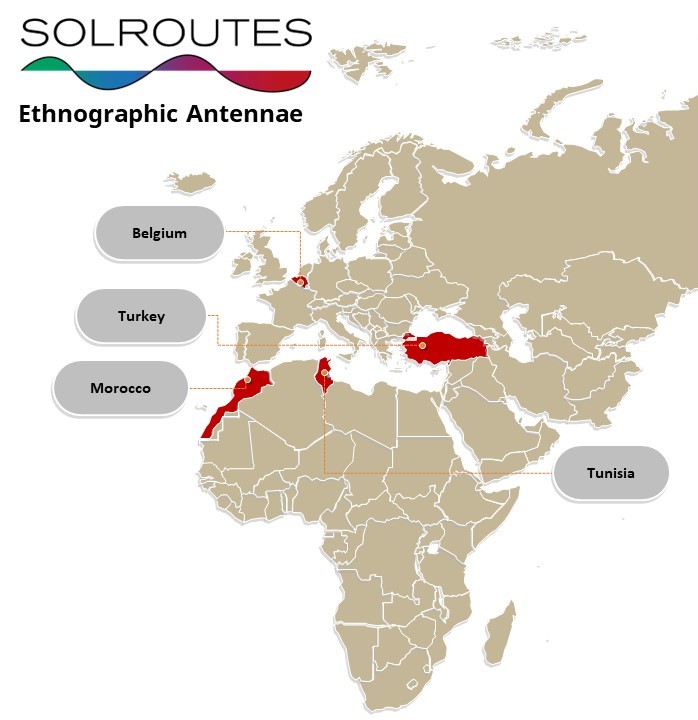Fieldwork Research Activities. The First Nodes
The second phase of the Solroutes project is already underway, with the PhD Solroutes researchers settling in four established ethnographic antennae in Morocco, Tunisia, Turkey and Belgium and conducting the following fieldwork research activities:
BELGIUM – NODE 1: Squatting in solidarity and the right to the city in Brussels. Belgium is a crucial space for secondary movements and attempts to settle people on the move who have not succeeded in obtaining asylum in other EU countries. The SOLROUTES research team aims to study the peculiarities of squats in Brussels and the forms of solidarity that emerge from these spaces. Squats are considered generative, stimulating alternative forms of citizenship through weaving citizenship from below and generating worlds of knowledge, information, survival tactics, solidarity, and sociability. The research team will seek collaboration with solidarity actors, migrants in transit, and art performers to co-construct the GNW cultural object (The ghosts of the Maximilian Park: experiences from post-eviction). The team will draw on ethnography and long-term volunteering of activists to gain sensitivity to people’s struggles, needs, and ways of being around them.
MOROCCO – NODE 1: Looking for spaces of solidarity in the peripheral urban landscape of Rabat. The Morocco Antenna is planning the first node in Rabat to study the city and its various actors in the delicate relationship between the centre and the periphery. The project aims to acknowledge the dynamics of solidarity and identify the actors, their functions and meanings. Rabat is identified as a hub for further mobility and settlement, where people on the move organize transit migration stages. The methodology is grounded research and multi-sited ethnography, with the presence of the research team determining methodological tools and specific research questions. The first Generative Narrative Workshop (How do I tell you my story: music to share out movements and settlements) will focus on music production to tell the stories of non-authorized movements and borderisation processes, reflecting on the right to mobility and the right to stay. The research team acknowledges the difficulties of initiating research in a previously unexplored context and will work with an Italian woman researcher who speaks Eastern Arabic.
TURKEY – NODE 1: Localizing Solidarities in Izmir: Affordances, Raptures, and Continuities. The research aims to analyse the formation of migrant solidarity movements in Izmir, Turkey, through the interplay of statecraft, international refugee policies, and historical political context. The study will focus on the pluralities of solidarity movements, including their repertoire of actions and citizenship regimes. Izmir is the first node in the fieldwork, with a multicultural past and secular-nationalist vein of the modern Republic of Turkey. The research team will map solidarity networks and engage with pro-migrant collectives and civil society organizations. The first GNW (Rembetiko of the refugees of a new era: The sound of the witnesses) will focus on Greek music, Rembetiko, expressing the pain, joy, and rebellion of outcasts in Izmir.
TUNISIA – NODE 1: Deportees and Solidarity – Exploring the Role of Solidarity Networks in the Migration Cycle of Deportees around Sfax and Mahdia. The SOLROUTES team is studying the impact of bilateral agreements between Tunisia and the EU member states, particularly Italy, on the migration cycle of deportees around Sfax and Mahdia. The team will focus on deportees, particularly those forced to return from Italy, and the challenges they encounter, such as reintegration difficulties, social stigmatization, and the desire to migrate again. They will collaborate with local filmmaker Hammadi Lassoued and engage with Tunisian men and women with relatives or acquaintances who have been deported to gain insights into their experiences. The team will also create a documentary that amplifies voices and provides a platform for the narratives of deportees and their allies. The team will also start a Generative Narrative Workshop (The deportees. Stories of hidden solidarities) with deported women to gather insights into their perspectives and experiences. Ethical concerns are crucial when conducting research, especially when dealing with vulnerable participants who may have experienced significant emotional and psychological challenges.





